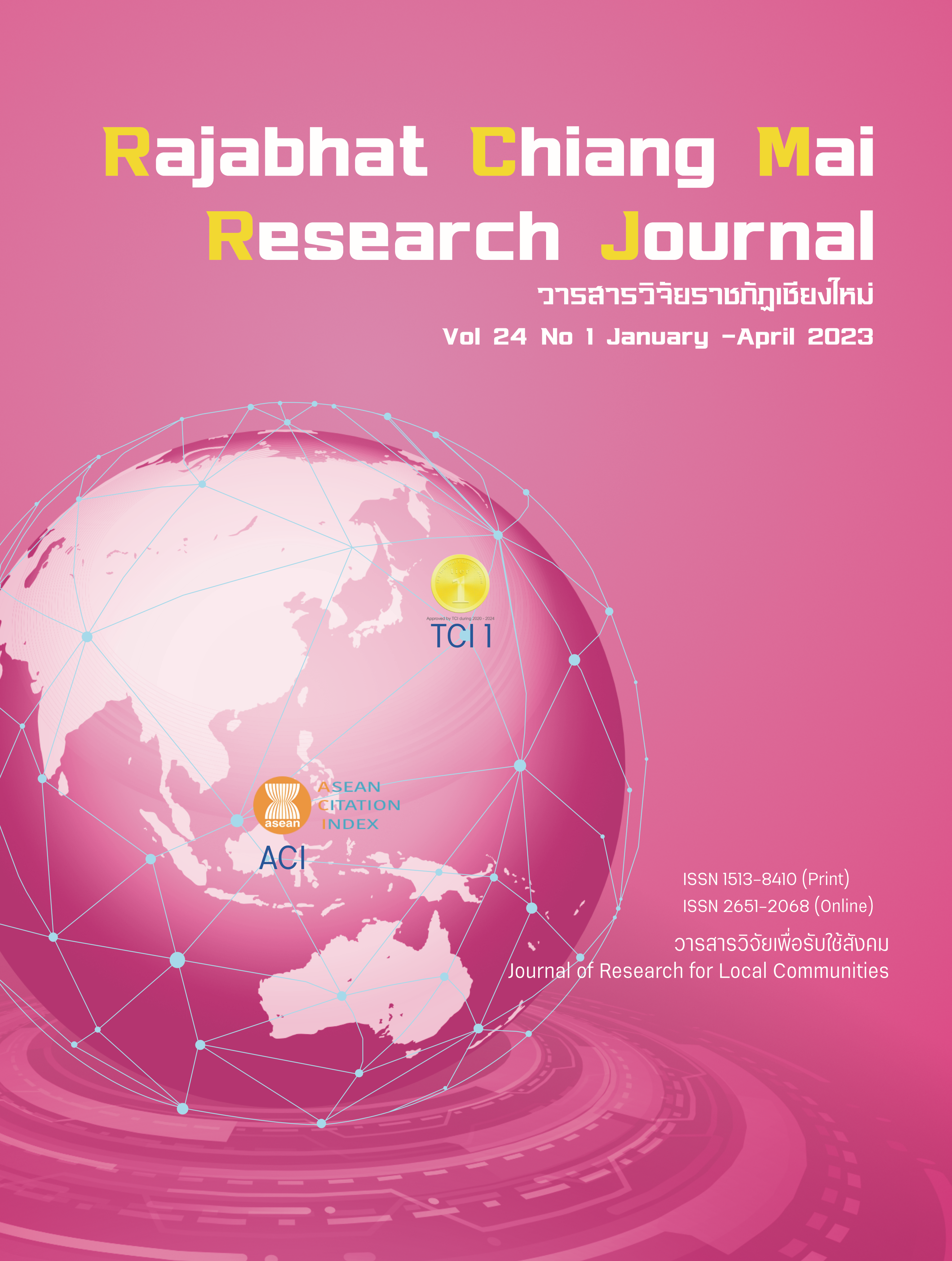The Effects of Teachers’ Teaching and Learning Management by Integrating CCR Concepts on the Teaching Behavior Change in Schools under the Office of the Basic Education Commission
DOI:
https://doi.org/10.57260/rcmrj.2023.261252Keywords:
Teaching and learning management, Integrating, The CCR conceptAbstract
The goal of this study was to examine the effects of teaching and learning management practices used by teachers in schools run by the Office of the Basic Education Commission by using CCR ideas. Teachers of mathematics who work in classrooms run by Secondary Educational Service Area Office 40, Phetchabun Province, made up the population. Purposive sampling was used to pick 127 individuals overall. The study tools included an observation form for teacher training development, a teacher supervision record, a supervision report form for teacher development project by integrating CCR principles, a teacher's teaching record, and a teacher satisfaction assessment form. Utilizing the mean and standard deviation, the quantitative data was examined, content analysis was used to analyze the qualitative data.
The study's findings indicated that teachers' teaching behaviors changed as a consequence of the development of mathematics instructors in line with the workshop titled “The teacher development by adopting CCR integration.” By using CCR ideas in schools, start by being able to develop learning management plans that utilize CCR integration for setting up math learning activities. According to the findings of the project's educational oversight of the math teachers who took part, the average results of the improvement of teaching and learning management increased for each individual item as well as overall, and the teachers who underwent development gave the workshop titled “the teacher development by CCR concepts integration” the highest level of overall satisfaction. Additionally, the qualitative data showed that teachers had altered their pedagogical practices. The instructors successfully managed their students' learning in the classroom by utilizing the CCR integration and the information and understanding they gained from the training in terms of the learning activity process. Through the use of a variety of activities, including singing, playing games, searching for information, using questions, solo and group activities, and presentations in front of the class, the teachers were found to have altered their teaching styles in accordance with the concepts of contemplative education, coaching and mentoring, and research-based learning. These gave pupils the chance to learn, comprehend, practice, and communicate their ideas, the usage of a range of instructional material by teachers to encourage and promote learning among pupils in the classroom was also noted.
Downloads
References
Ampanon, K. (2018). The Development of Learning Management that Promotes Thinking Skills by Using Mind Mapping for Students of the Faculty of Education at hetchabun Rajabhat University. Phetchabun Rajabhat Journal, 20(2), 87-101. http://research.pcru.ac.th/rdb/project/datafiles?id=1714&tag (In Thai)
Ampanon, K. (2019). Learning Management that Promotes Thinking Skills Using Mind Mapping for Students of the Faculty of Education of Rajabhat University. Journal of Southern Technology, 12(2), 247-256. https://so04.tcithaijo.org/index.php/journal_sct/article/ view/167998/154001 (In Thai)
Buzan, T. (1991). Use Both Sides of Your Brain. New York: Penguin Group.
Flavell, J. H. (1979). Cognitive Developmental. New Jersey: Prentice-Hall.
Mckinney, K. (2008). Sociology through Active Learning. Retrieved from http://www.teachtech.ilstu.edu/additional/tips/newActive.pdf.
Methawut, P. (2015). Teaching and Learning Based on Research. Bangkok: Chulalongkorn University. (In Thai)
Mezirow, J. (2003). Transformative learning as discourse. Journal: Transformative Education, 12(1), 58-63. https://journals.sagepub.com/doi/10.1177/1541344603252172.
Panich, W. (2018). Paths to Creating Learning for 21st Century Students. (3rd ed.). Bangkok: Sodsri-Saritwong Foundation. (In Thai)
Panyapinitnukul, C. (2015). Effects of Contemplative Education on Learning for Personnel Changes Boromarajonani College of Nursing Bangkok. Boromarajonani College of Nursing Journal, 28(2), 38-51. https://he01.tci-thaijo.org/index.php/bcnbangkok/ article/view/32046 (In Thai)
Pusiripinyo, V. (2018). Developing a Teaching Model Integrated the Concepts of Contemplative Education, Research-based Learning, Coaching for Preparing Student Teachers, Majoring in English to Community. Academic Journal: Buriram Rajabhat University, 10(2), 97-122. https://e-journal.snru.ac.th/topics/1345/ (In Thai)
Reungdam, S. (2018). The Effects of Integrating the Concept of Contemplative Education, Coaching and Mentoring and Research-based Learning to Change Teaching Behavior and Development of Teaching Competency of Teacher Students in Thai Language major. Narkbhut paritat: Nakhon Si Thammarat Rajabhat University, 10(2), 15-25. https://so04.tci-thaijo.org/index.php/nakboot/article/view/115916 (In Thai)
Sinlarat, P. (2016). The Creative and Productive Education. Bangkok: Chulalongkorn University. (In Thai)
Thongtavee, C. (2015). Contemplative Education: Education for Human Development. Nakhon Pathom: Comtemplative Education Center Mahidol University. (In Thai)
Wasi, P. (2017). The Education System Curing the Whole Country’s Poverty. (3rd ed.). Nakhon Pathom: Comtemplative Education Center Mahidol University. (In Thai)
Downloads
Published
How to Cite
Issue
Section
License
Copyright (c) 2023 Rajabhat Chiang Mai Research Journal

This work is licensed under a Creative Commons Attribution-NonCommercial-NoDerivatives 4.0 International License.
1. Articles, information, content, images, etc published in the “Community and Social Development Journal” are copyrighted by the Community and Social Development Journal, Chiang Mai Rajabhat University. In order to properly distribute the articles through print and electronic media, the authors still hold the copyright for the published articles under the Creative Commons Attribution (CC BY) license, which allows the re-distribution of the articles in other sources. References must be made to the articles in the journal. The authors are responsible for requesting permission to reproduce copyrighted content from other sources.
2. The content of the articles appearing in the journal is the direct responsibility of the article authors. The editorial board of the journal does not necessarily agree with or share any responsibility.














